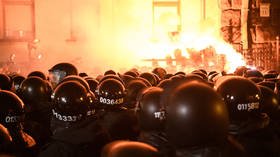Russia planning tough measures against ‘lawless’ social media giants, after Facebook bans ‘fact-checked’ Neo-Nazi arrest reports

In the face of perceived censorship from US-based tech companies, Russia will tighten laws and protest to international bodies, the country’s top parliamentarian has said, as part of a row over the blocking of online news stories.
In February, a number of Russian-language news outlets, including TASS, Kommersant and RBK, announced that Facebook had removed a series of their articles from the site. The content in question related to claims from the FSB, Russia’s top security agency, that it had arrested a group of Neo-Nazi radicals in the western city of Voronezh. The service’s press release described them as “supporters” of a Ukrainian youth radical group “involved in propaganda.” Much of the subsequent coverage linked them to groups across the border.
However, a probe by controversial Ukrainian fact-checking group StopFake, bankrolled by the UK government and other Western sources, alleged that the articles were inaccurate, as the radicals were Russian citizens, triggering the response from Facebook. However, as US state-run media RFERL notes, the original FSB release avoided claiming that the suspects were Ukrainians or members of any foreign organization. StopFake has itself been accused of links to Ukrainian far-right groups and of applying double standards when it comes to Russian content.
Also on rt.com EXCLUSIVE: Ultranationalist organizations are radicalizing Ukraine’s young people, and the Kiev government is paying them for itOn Monday, the Chairman of Russia’s national parliament, Vyacheslav Volodin, issued a statement claiming that “this decision from Facebook violates the fundamental rights and freedoms of citizens, like the right to disseminate and receive information.” He added that “This is not the first time this has happened on the part of Facebook – Instagram and Twitter have done the same previously. I think this is unacceptable.”
Volodin argued that the move “violates national laws” and, in response, parliamentarians would “propose legislative solutions that will stop this from happening in relation to the Russian media.” Many nations, he argued, such as Italy, Australia, and India, “are developing proposals to combat the lawlessness of global IT companies and apply the most serious measures of responsibility.”
Leonid Slutsky, the chairman of the parliamentary committee on International Affairs, also slammed the California-based tech giant’s approach. “Blocking Facebook posts from a number of Russian media outlets … compiled on the basis of official press releases from the FSB and the Investigative Committee, is the most severe form of censorship and bias,” he insisted. Russia will raise the issue with international partners at a number of upcoming summits, Slutsky added.
TASS, which was affected by the block on coverage, intends to contact Facebook to demand it shed light on the decision, while Russia’s media regulator, Roskomnadzor, will also investigate the matter.
Think your friends would be interested? Share this story!













